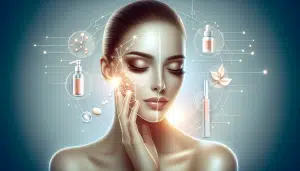Secrets Behind Glowing Skin You Might Not Expect
Charlotte Stone August 26, 2025
Discover the unexpected factors shaping glowing skin and how a combination of skincare, nutrition, and mindfulness can unlock natural radiance. This guide explores proven routines, key ingredients, and holistic tips that elevate wellness and beauty, helping you achieve a complexion that feels refreshed, healthy, and vibrant.
Understanding the Science of Radiant Skin
Glowing skin is often considered a hallmark of beauty and well-being. The science behind a radiant complexion is fascinating and intertwined with much more than just topical creams. Skin appearance reflects both internal health and external routines. Dermatologists agree that factors such as hydration, genetics, and environmental exposure all play pivotal roles in how the skin looks and feels. Skin barrier function, which refers to the outermost layer protecting us from pollutants, needs consistent support for true radiance. Understanding this underlying biology helps guide smarter choices for skin health, from recognizing early signs of imbalance to selecting ingredients that target hydration and resilience (Source: https://www.aad.org/public/everyday-care/skin-care-basics/care/skin-barrier).
Another scientific pillar of radiant skin is the balance of natural oils and moisture. Skin’s production of sebum, a key natural oil, ensures flexibility and protection. Yet, disruptions can trigger dullness, flakiness, or breakouts. Individuals with skin conditions often see immediate changes in their complexion’s glow, indicating how rapidly the epidermis responds to external influences. Health professionals stress that sleep, diet, and stress levels impact skin appearance just as much as cleansers and moisturizers. Even a subtle shift in stress management or dietary choice can brighten or dull skin within days, highlighting the interconnected nature of wellness and beauty routines (Source: https://www.ncbi.nlm.nih.gov/pmc/articles/PMC5843359/).
Science also reveals how cellular renewal and exfoliation are keys to maintaining vibrancy. Each skin cell has a life cycle—older cells naturally slough away, making room for new, glowing tissue. Factors like age and environment slow this process, resulting in a tired look. Supportive routines that encourage gentle exfoliation can invigorate skin, allowing brighter layers to shine through. Awareness of cellular turnover often motivates people to invest in both natural methods and proven skincare ingredients to keep their complexion lively and resilient over time (Source: https://www.dermnetnz.org/topics/skin-barrier-function).
Daily Routines That Foster Real Glow
Developing a thoughtful skincare routine is foundational for supporting a radiant complexion. Consistency matters more than the number of products used. Simple actions like gentle cleansing, effective hydration, and sun protection create a canvas ready for radiance. A mild cleanser preserves the skin’s natural oils, preventing dehydration and tightness. Dermatologists frequently highlight that even the most advanced serums need a clean surface to be effective. This ritual—cleansing, moisturizing, and protecting—sets the stage for healthy, balanced skin every day (Source: https://www.clevelandclinic.org/health/skin-care-basics).
Integrating key ingredients like hyaluronic acid, niacinamide, and antioxidants into your regimen supports ongoing vibrancy. Hyaluronic acid is renowned for its remarkable ability to retain moisture, plumping the skin and smoothing fine lines. Niacinamide, a form of vitamin B3, calms redness and can improve uneven tone. Antioxidants neutralize free radicals, protecting the skin from environmental stressors such as pollution and UV rays. Skincare brands and medical experts alike agree that mixing these components promotes an inner strength and visible luminosity. Proper order—serum before moisturizer, sunscreen last—enhances each step’s effectiveness for that subtle, dewy shine (Source: https://www.health.harvard.edu/staying-healthy/skin-care-products-for-a-healthier-complexion).
Sun protection may be the most overlooked habit in the pursuit of glowing skin. Ultraviolet rays can accelerate aging, break down collagen, and create uneven pigmentation, all of which diminish luminosity. Daily use of broad-spectrum sunscreen, even on cloudy days, fortifies the skin against damage and supports a fresh appearance for years. Many dermatologists recommend a daily SPF as a cornerstone for both beauty and prevention. Embracing sun-safe habits has the potential to be transformative, as consistent protection leads to a more even, vibrant complexion over time (Source: https://www.skincancer.org/skin-cancer-prevention/sun-protection).
Nutrition’s Surprising Role in Complexion Health
The link between nutrition and radiant skin is both direct and subtle. Nutrients consumed daily actively influence how the skin functions and appears. For instance, vitamin C assists in the formation of collagen, a protein essential for a supple and elastic appearance. Omega-3 fatty acids, found in foods like salmon and walnuts, help strengthen the lipid barrier, locking in moisture. Water intake also remains a non-negotiable component of inner glow—dehydration can manifest as dryness and a lackluster tone. Many individuals notice visible improvement in skin vibrancy after adopting a nutrient-rich diet or increasing hydration, validating the connection between wellness and beauty (Source: https://www.hsph.harvard.edu/nutritionsource/vitamins/vitamin-c).
Antioxidant-rich foods like berries, kale, and dark chocolate provide protective benefits at the cellular level. Free radicals damage skin cells and can lead to premature aging or dullness. Antioxidants counteract these effects and support repair from within. This makes dietary choices as influential as expensive serums. Medical research supports that individuals with diverse, colorful diets display signs of better skin tone and slower visible aging. The phrase, “beauty from the inside out,” is more accurate than many realize—well-nourished skin radiates wellness naturally (Source: https://www.eatright.org/health/wellness/healthy-aging/foods-for-healthy-skin).
Nutritional gaps, conversely, can reveal themselves on the face. Deficiencies in vitamins such as zinc, selenium, or vitamin E may lead to increased sensitivity, acne, or reduced healing. Ensuring a well-rounded plate not only supports overall health but also helps address visible skin issues. While supplementation is sometimes suggested for those with limited access to fresh produce, most experts recommend food-first approaches for long-term skin wellness. Routine check-ups with a health professional can help evaluate whether dietary modifications or supplements might help maintain or restore a glowing complexion (Source: https://www.ncbi.nlm.nih.gov/pmc/articles/PMC3583891/).
Holistic Self-Care Practices Enhance Beauty
Holistic self-care goes beyond topical routines to encompass practices that benefit the mind and body alike. Regular movement, meditation, and high-quality sleep all contribute to complexion health. Stress reduction is especially impactful; high cortisol levels are correlated with inflammation and breakouts. Engaging in mindfulness practices or light exercise can reduce tension and foster a sense of calm, which manifests in clearer, calmer-looking skin. Studies suggest that consistently prioritizing rest, physical activity, and relaxation can reveal noticeable improvements in skin smoothness and glow (Source: https://www.sleepfoundation.org/how-sleep-works/why-do-we-need-sleep).
Sleep, in particular, is a powerful tool for glowing skin. During rest, the body repairs tissues and replenishes cells, including those of the skin’s surface. Chronic sleep deprivation can result in puffiness, dryness, and a lack of vibrance. Many people observe that a full night’s rest transforms their skin’s tone and softness. Developing a sleep routine—consistent hours, reducing screens before bed, and maintaining a restful environment—supports not only general well-being, but also the pursuit of beauty via natural mechanisms that restore and rejuvenate (Source: https://www.healthline.com/health/beauty-sleep).
Beyond rest, holistic rituals such as facial massage, breathing exercises, or warm baths can support relaxation and increase blood flow to the skin. These gentle acts stimulate circulation, assist lymphatic drainage, and promote flush, glowing cheeks. Taking time for self-care, even in small ways, sends signals of safety and care throughout the body, with beauty as a natural byproduct. By integrating such rituals alongside traditional skincare, individuals often report an enduring, almost effortless glow that feels as good as it looks.
Debunking Myths Around Glowing Skin
The pursuit of radiant skin is surrounded by many myths, leading people down ineffective or even harmful paths. A persistent misconception is that more products guarantee better results. Overloading the skin, especially with harsh or redundant ingredients, frequently disrupts natural balance and causes irritation. Minimalism in routines—selecting a few high-impact elements—often produces both better outcomes and less stress for the skin. Trusted sources reinforce the importance of focusing on gentle, evidence-based formulations rather than chasing trends (Source: https://www.mayoclinic.org/healthy-lifestyle/adult-health/in-depth/skin-care/art-20048237).
Another widespread myth is that only expensive products generate a healthy glow. In reality, affordable and accessible routines can be just as effective as luxury brands. Key is the inclusion of proven ingredients—like hyaluronic acid or vitamin C—and consistent, mindful application. Many find that shifting focus from cost to quality and reliability allows for greater skin resiliency over time. Dermatology professionals regularly stress that product marketing often overshadows genuine results driven by simple, scientifically-backed steps.
Lastly, the idea that glowing skin is genetic destiny leaves many feeling powerless. While genetics undoubtedly influence underlying skin behavior, everyday choices—hydration, sun habits, nutrition, and self-care—strongly shape radiance potential. Efforts to adopt holistic approaches have helped countless individuals achieve visible improvements independent of family history. Well-being and beauty are dynamic and responsive, rather than set in stone.
Summary: Creating Your Path to Radiant Skin
Achieving glowing skin is an ongoing journey rooted in balance, consistency, and self-knowledge. Daily routines that focus on both external care and internal nourishment create the foundation for luminosity. Establishing a blend of gentle cleansing, hydration, sun protection, and nourishing meals can make a notable difference in your complexion’s vitality. Recognizing the link between wellness and beauty empowers sustainable, healthy approaches to skin care.
Self-care practices that address stress, sleep quality, and relaxation round out this picture, leading to visible transformations that reflect emotional and physical health. Simple rituals can renew not only the face, but the mind as well. Keeping a critical eye on myths and embracing proven, holistic solutions allows for steady progress toward beauty goals, regardless of age or background. Remember, change is cumulative. Small steps matter.
Exploring radiant skin through evidence-based routines, mindful choices, and nutritional awareness unlocks possibilities for nearly everyone. Focusing on balance rather than extremes transforms the pursuit of wellness and beauty into a joyful, self-affirming experience. As your daily habits shift, the subtle signs of glow unfold, offering visible proof that inside-out wellness truly makes a difference.
References
1. American Academy of Dermatology Association. (n.d.). Skin barrier function. Retrieved from https://www.aad.org/public/everyday-care/skin-care-basics/care/skin-barrier
2. Draelos, Z.D. (2018). The science behind glowing skin. Retrieved from https://www.ncbi.nlm.nih.gov/pmc/articles/PMC5843359/
3. DermNet NZ. (n.d.). Skin barrier function. Retrieved from https://www.dermnetnz.org/topics/skin-barrier-function
4. Harvard T.H. Chan School of Public Health. (n.d.). Vitamin C. Retrieved from https://www.hsph.harvard.edu/nutritionsource/vitamins/vitamin-c
5. The Skin Cancer Foundation. (n.d.). Sun protection. Retrieved from https://www.skincancer.org/skin-cancer-prevention/sun-protection
6. Mayo Clinic. (n.d.). Skin care: 5 tips for healthy skin. Retrieved from https://www.mayoclinic.org/healthy-lifestyle/adult-health/in-depth/skin-care/art-20048237







